Few see Biden or Trump as especially religious
Pew Research Center conducted this survey to explore Americans’ attitudes about religion’s role in public life, including politics in a presidential election year.
For this report, we surveyed 12,693 respondents from Feb. 13 to 25, 2024. Most of the respondents (10,642) are members of the American Trends Panel, an online survey panel recruited through national random sampling of residential addresses, which gives nearly all U.S. adults a chance of selection.
The remaining respondents (2,051) are members of three other panels, the Ipsos KnowledgePanel, the NORC Amerispeak panel and the SSRS opinion panel. All three are national survey panels recruited through random sampling (not “opt-in” polls). We used these additional panels to ensure that the survey would have enough Jewish and Muslim respondents to be able to report on their views.
The survey is weighted to be representative of the U.S. adult population by gender, race, ethnicity, partisan affiliation, education, religious affiliation and other categories.
For more, refer to the ATP’s Methodology and the Methodology for this report. Read the questions used in this report.
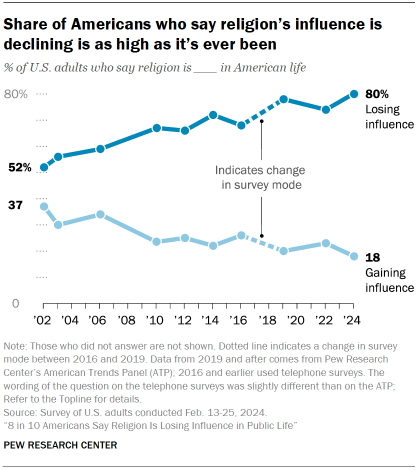
A new Pew Research Center survey finds that 80% of U.S. adults say religion’s role in American life is shrinking – a percentage that’s as high as it’s ever been in our surveys.
Most Americans who say religion’s influence is shrinking are not happy about it. Overall, 49% of U.S. adults say both that religion is losing influence and that this is a bad thing. An additional 8% of U.S. adults think religion’s influence is growing and that this is a good thing.
Together, a combined 57% of U.S adults – a clear majority – express a positive view of religion’s influence on American life.
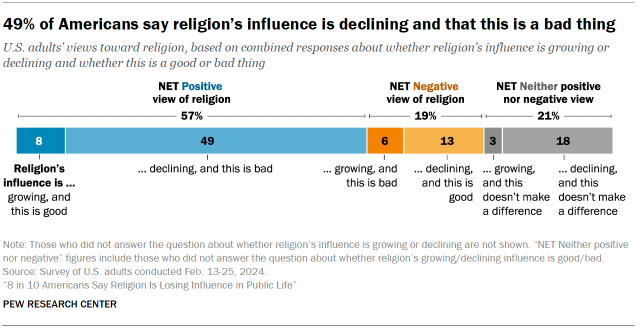
The survey also finds that about half of U.S. adults say it’s “very” or “somewhat” important to them to have a president who has strong religious beliefs, even if those beliefs are different from their own. But relatively few Americans view either of the leading presidential candidates as very religious: 13% of Americans say they think President Joe Biden is very religious, and just 4% say this about former President Donald Trump.
Overall, there are widespread signs of unease with religion’s trajectory in American life. This dissatisfaction is not just among religious Americans. Rather, many religious and nonreligious Americans say they feel that their religious beliefs put them at odds with mainstream culture, with the people around them and with the other side of the political spectrum. For example:
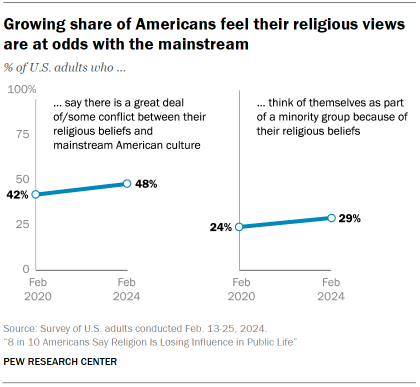
- 48% of U.S. adults say there’s “a great deal” of or “some” conflict between their religious beliefs and mainstream American culture, up from 42% in 2020.
- 29% say they think of themselves as religious minorities, up from 24% in 2020.
- 41% say it’s best to avoid discussing religion at all if someone disagrees with you, up from 33% in 2019.
- 72% of religiously unaffiliated adults – those who identify, religiously, as atheist, agnostic or “nothing in particular” – say conservative Christians have gone too far in trying to control religion in the government and public schools; 63% of Christians say the same about secular liberals.
These are among the key findings of a new Pew Research Center survey, conducted Feb. 13-25, 2024, among a nationally representative sample of 12,693 U.S. adults.
This report examines:
- Religion’s role in public life
- U.S. presidential candidates and their religious engagement
- Christianity’s place in politics, and “Christian nationalism”
The survey also finds wide partisan gaps on questions about the proper role for religion in society, with Republicans more likely than Democrats to favor religious influence in governance and public life. For instance:
- 42% of Republicans and Republican-leaning independents say that when the Bible and the will of the people conflict, the Bible should have more influence on U.S. laws than the will of the people. Just 16% of Democrats and Democratic-leaning independents say this.
- 21% of Republicans and GOP leaners say the federal government should declare Christianity the official religion of the United States, compared with 7% of Democrats and Democratic leaners.
Moral and religious qualities in a president
Almost all Americans (94%) say it is “very” or “somewhat” important to have a president who personally lives a moral and ethical life. And a majority (64%) say it’s important to have a president who stands up for people with their religious beliefs.
About half of U.S. adults (48%) say it is important for the president to hold strong religious beliefs. Fewer (37%) say it’s important for the president to have the same religious beliefs as their own.
Republicans are much more likely than Democrats to value religious qualities in a president, and Christians are more likely than the religiously unaffiliated to do so. For example:
- Republicans and GOP leaners are twice as likely as Democrats and Democratic leaners to say it is important to have a president who has the same religious beliefs they do (51% vs. 25%).
- 70% of White evangelical Protestants say it is important to have a president who shares their religious beliefs. Just 11% of religiously unaffiliated Americans say this.
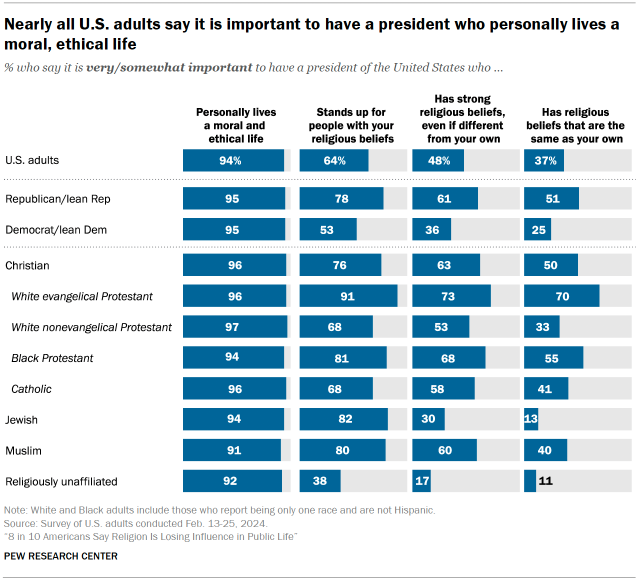
Views of Biden, Trump and their religious engagement
Relatively few Americans think of Biden or Trump as “very” religious. Indeed, even most Republicans don’t think Trump is very religious, and even most Democrats don’t think Biden is very religious.
- 6% of Republicans and GOP leaners say Trump is very religious, while 44% say he is “somewhat” religious. Nearly half (48%) say he is “not too” or “not at all” religious.
- 23% of Democrats and Democratic-leaning independents say Biden is very religious, while 55% say he is somewhat religious. And 21% say he is not too or not at all religious.
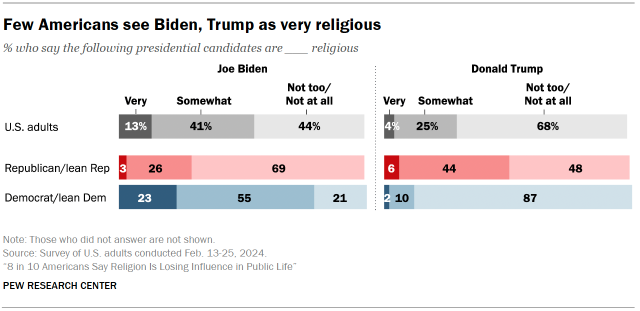
Though they don’t think Trump is very religious himself, most Republicans and people in religious groups that tend to favor the Republican Party do think he stands up at least to some extent for people with their religious beliefs. Two-thirds of Republicans and independents who lean toward the GOP (67%) say Trump stands up for people with their religious beliefs “a great deal,” “quite a bit” or “some.” About the same share of White evangelical Protestants (69%) say this about Trump.
Similarly, 60% of Democrats and Democratic-leaning independents, as well as 73% of Jewish Americans and 60% of Black Protestants, say Biden stands up for people with their religious beliefs a great deal, quite a bit or some.
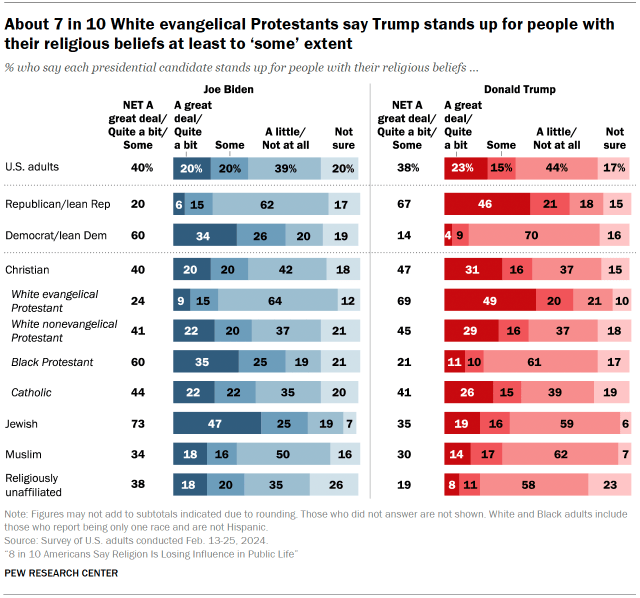
Overall, views of both Trump and Biden are generally unfavorable.
- White evangelical Protestants – a largely Republican group – stand out as having particularly favorable views of Trump (67%) and unfavorable views of Biden (86%).
- Black Protestants and Jewish Americans – largely Democratic groups – stand out for having favorable views of Biden and unfavorable views of Trump.
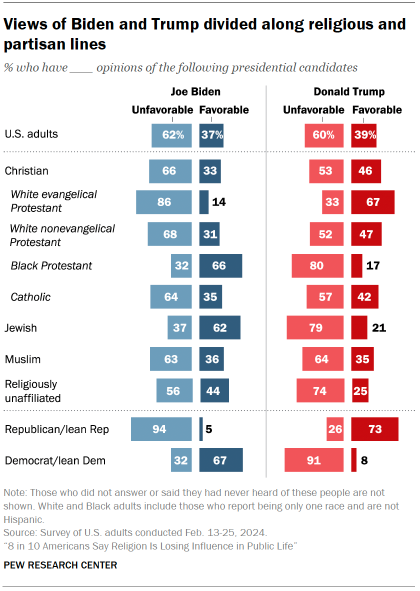
Views on trying to control religious values in the government and schools
Americans are almost equally split on whether conservative Christians have gone too far in trying to push their religious values in the government and public schools, as well as on whether secular liberals have gone too far in trying to keep religious values out of these institutions.
Most religiously unaffiliated Americans (72%) and Democrats (72%) say conservative Christians have gone too far. And most Christians (63%) and Republicans (76%) say secular liberals have gone too far.
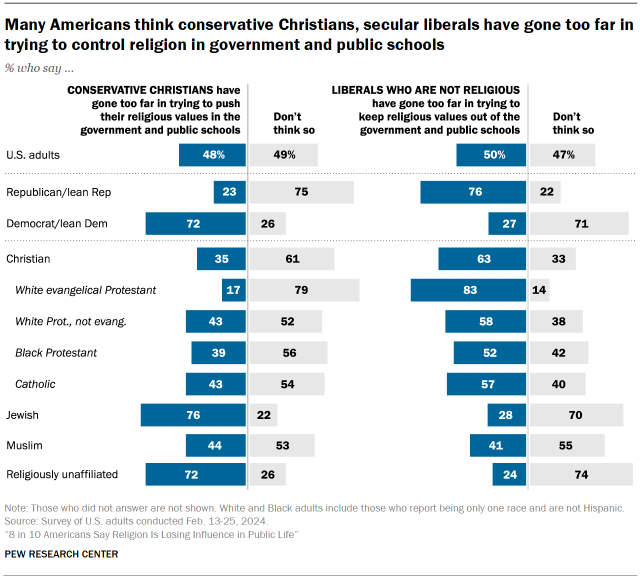
Christianity’s place in politics, and Christian nationalism
In recent years, “Christian nationalism” has received a great deal of attention as an ideology that some critics have said could threaten American democracy.
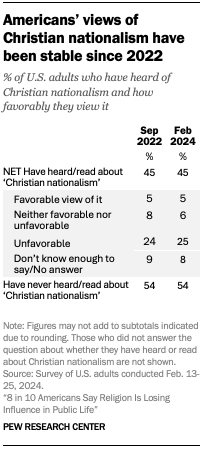
Despite growing news coverage of Christian nationalism – including reports of political leaders who seem to endorse the concept – the new survey shows that there has been no change in the share of Americans who have heard of Christian nationalism over the past year and a half. Similarly, the new survey finds no change in how favorably U.S. adults view Christian nationalism.
Overall, 45% say they have heard or read about Christian nationalism, including 25% who also have an unfavorable view of it and 5% who have a favorable view of it. Meanwhile, 54% of Americans say they haven’t heard of Christian nationalism at all.
One element often associated with Christian nationalism is the idea that church and state should not be separated, despite the Establishment Clause in the First Amendment to the U.S. Constitution.
The survey finds that about half of Americans (49%) say the Bible should have “a great deal” of or “some” influence on U.S. laws, while another half (51%) say it should have “not much” or “no influence.” And 28% of U.S. adults say the Bible should have more influence than the will of the people if the two conflict. These numbers have remained virtually unchanged over the past four years.
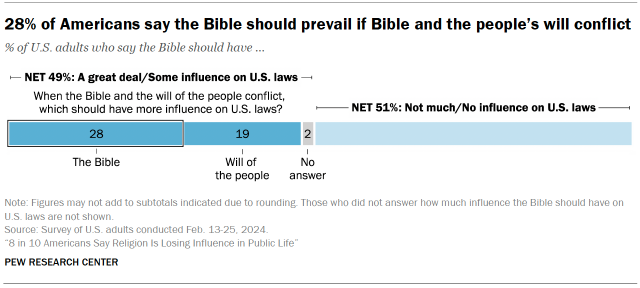
In the new survey, 16% of U.S. adults say the government should stop enforcing the separation of church and state. This is little changed since 2021.
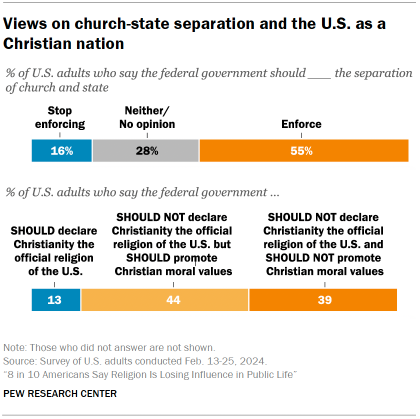
In response to a separate question, 13% of U.S. adults say the federal government should declare Christianity the official religion of the U.S., and 44% say the government should not declare the country a Christian nation but should promote Christian moral values. Meanwhile, 39% say the government should not elevate Christianity in either way.1
Overall, 3% of U.S. adults say the Bible should have more influence on U.S. laws than the will of the people; and that the government should stop enforcing separation of church and state; and that Christianity should be declared the country’s official religion. And 13% of U.S. adults endorse two of these three statements. Roughly one-fifth of the public (22%) expresses one of these three views that are often associated with Christian nationalism. The majority (62%) expresses none.
Guide to this report
The remainder of this report describes these findings in additional detail. Chapter 1 focuses on the public’s perceptions of religion’s role in public life. Chapter 2 examines views of presidential candidates and their religious engagement. And Chapter 3 focuses on Christian nationalism and views of the U.S. as a Christian nation.




